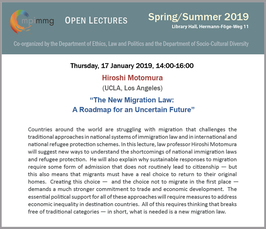"The New Migration Law: A Roadmap for an Uncertain Future"
Open Lectures Spring/Summer 2019
- Date: Jan 17, 2019
- Time: 02:00 PM - 04:00 PM (Local Time Germany)
- Speaker: Hiroshi Motomura (UCLA, Los Angeles)
- HIROSHI MOTOMURA is the Susan Westerberg Prager Distinguished Professor of Law at the School of Law at the University of California, Los Angeles (UCLA). A leading scholar and teacher of immigration and citizenship, he is the author of many influential articles and two award-winning books: Americans in Waiting (Oxford 2006) and Immigration Outside the Law (Oxford 2014), and a co-author of two casebooks widely used in U.S. law school courses: Immigration and Citizenship: Process and Policy (8th ed. West 2016), and Forced Migration: Law and Policy (2d ed. West 2013). He is Vice Chair of the Board of Directors of the National Immigration Law Center, founding director of the Rocky Mountain Immigrant Advocacy Network (RMIAN), and a former member of the American Bar Association Commission on Immigration. He is now at work on a new book, The New Migration Law, with the support of a 2018 Guggenheim Fellowship.
- Location: MPI-MMG, Hermann-Föge-Weg 12, Göttingen
- Room: Conference Room

For more details please contact adomeit(at)mmg.mpg.de.
Countries around the world are struggling with migration that challenges the traditional approaches in national systems of immigration law and in international and national refugee protection schemes. In this lecture, law professor Hiroshi Motomura will suggest new ways to understand the shortcomings of national immigration laws and refugee protection. He will also explain why sustainable responses to migration require some form of admission that does not routinely lead to citizenship — but this also means that migrants must have a real choice to return to their original homes. Creating this choice — and the choice not to migrate in the first place — demands a much stronger commitment to trade and economic development. The essential political support for all of these approaches will require measures to address economic inequality in destination countries. All of this requires thinking that breaks free of traditional categories — in short, what is needed is a new migration law.